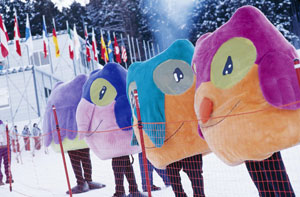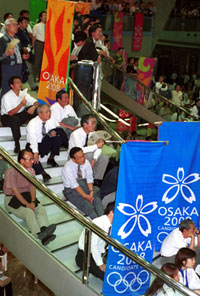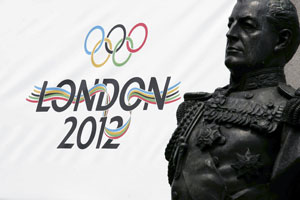The Olympic Games are a festival aimed at the development of youth and promotion of world peace via sports. Participants are required to compete in a spirit of friendship, solidarity and fair play without any kind of discrimination whatsoever.
Therefore, in order to be elected as the host city for the Olympics, not only is it necessary to have the financial base and infrastructure required for staging the Games, the government of the country concerned must also guarantee respect for the Olympic Charter, which stipulates the Olympic ideal.
Also, in consideration of the ideals of world peace and mutual understanding, care is required to ensure that host cities are not concentrated in specific countries or regions.
The cities that originally applied to the IOC to host the 24th Olympic Games of 1988 were Seoul, Melbourne, Athens and Nagoya. Melbourne and Athens eventually dropped their applications, so the ballot that was held to determine the host city at the 84th Session of the IOC in Baden-Baden in September 1981 was a straight contest between Nagoya and Seoul. Although Nagoya had been regarded as the favorite, the final ballot result was a victory for Seoul by 52 votes to 27.
The thrust behind Seoul's appeal was that the Olympics provided an opportunity to promote international reconciliation that was otherwise difficult to achieve through political methods in a divided country such as Korea, while also emphasizing that it would be the first Olympic Games to be staged in a developing nation. Since the world was in the midst of the Cold War around this time, these arguments from Seoul proved persuasive.
In addition, since the Olympic Games had already been staged in Tokyo and Asia, it is thought that concern about Japan monopolizing the Olympic Movement in Asia also influenced the final result.

The 1998 Winter Olympics in Nagano (photograph provided by AfloSport)
In recent years, environmental consideration has become one of the most important conditions required of Olympic host cities. When Nagano bid for the 18th Winter Olympics of 1998, it had "Coexistence with Nature" as its theme. Since part of the venue included land designated as a national park, the issue of how to run the event without destroying the environment was the biggest point.
Staging the Olympics had been a dream of Nagano's since before World War II. Nagano had previously applied to host the Winter Olympics in 1940 (the "Games that never were") and 1972, but on both occasions lost out to Sapporo in the domestic selection process.
Nagano's rivals to become Japan's candidate city at this time were Asahikawa, Yamagata and Morioka. As a result of the ballot that took place at the general assembly of the JOC in June 1988, Nagano took 34 out of the 45 votes and won the nomination after a single round of voting.
At the selection staged at the 97th IOC Session in Birmingham, United Kingdom, in 1991, Nagano triumphed over the other candidate cities of stersund, Jaca, Aosta and Salt Lake City. Nagano's long-standing dream was finally realized. The ballot to gain a simple majority of the votes went down to the wire and Nagano eventually won a run-off ballot against Salt Lake City by 46 votes to 42.
Following selection, the campaign ideal of "Coexistence with Nature" was upheld in the design of venues and courses and the running of events, and the Games gained attention for, among other things, introducing low-emission vehicles and adopting staff uniforms made from recycled fibers.
2001: Osaka eliminated in the first round

New selection procedures were introduced for determining the host for the 29th Olympic Games of 2008, for which Japan had submitted Osaka as a candidate.
The change in procedures was prompted by the uncovering of a scandal regarding Salt Lake City's bids for the 1998 and 2002 Games. The Salt Lake Organizing Committee was accused of giving financial favors to and spending excessive funds on entertaining certain members of the IOC.
The IOC installed a reform commission and an ethics commission, and took it upon itself to overhaul its procedures. Bidding processes were affected, with IOC member visits to potential host cities banned. A new system of voting based on reports made by the evaluation commission was introduced instead.
Apart from Osaka, in the running for the 2008 Olympics were Beijing, Toronto, Istanbul, and Paris. Unfortunately, Osaka was unable to compete with these internationally well-known cities, and at the 112th IOC Session in Moscow (July 2001) Osaka was eliminated in the first round of voting, receiving only six out of 102 votes. Beijing was the favorite from the beginning, and was successful in its bid on the second round of voting.
2009: Tokyo was voted out after the 2nd round of voting

Tokyo announces candidacy for the 31st Olympics in 2016. At the 1st qualification round, Tokyo was officially selected as one of the 4 candidate cities deemed capable of organizing the Olympics together with Chicago, Rio de Janeiro and Madrid. Besides scoring full points for accommodation facilities, Tokyo also received good reviews for its environment, security and Olympic village, ending up with the highest overall point average among all the cities.
After going through the presentations and local study missions by the IOC Evaluation Committee, the 121st IOC general meeting was held on Oct 2, 2009 to vote on the venue. Chicago was voted out of the race at the first round of voting. At the 2nd round of voting, Tokyo came in last among the 3 cities, bringing its bid to an unfortunate end. Overcoming Madrid in the final round of voting, Rio de Janeiro was thus selected as the venue for the 2016 Olympics.
Tokyo was selected as an official candidate

On May 24, 2012, Tokyo was selected as an official candidate to host the 32nd Olympics together with Istanbul (Turkey) and Madrid (Spain).
Japan has campaigned to host the Olympics on numerous occasions and has succeeded in hosting three Olympic games. Here, we take a look at the history of Japan's bids for the Olympics.
References
The Olympic Charter
1972 Sapporo Olympics Official Report
Sapporo Olympics Bid Committee Report
1964 Tokyo Olympics Official Report
Nagano Olympics Event Proposal (Overview)
Nagano Olympics Bid Report
Nagano Olympics Official Report
2008 Olympic Bid Activities Report
Progress Report on Japan's Bidding Activities in the Tokai Region for Nagoya's Bid for the Games of the 24th Olympiad
A Century of Olympic Games, BASEBALL MAGAZINE SHA Co., Ltd.